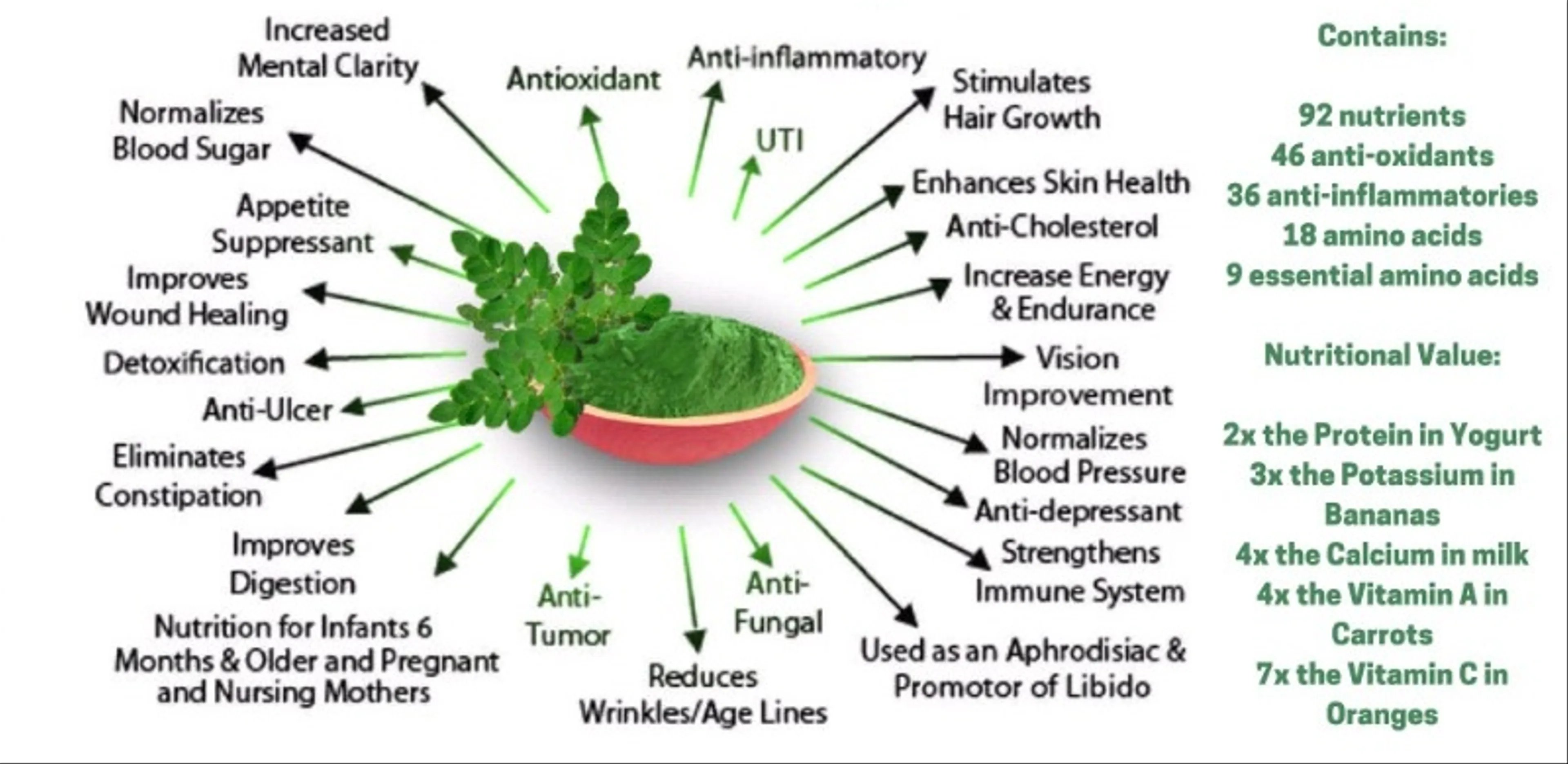The Benefits of Moringa
A big question asked is: what are the benefits of moringa? Well, the quick and simple answer is: lots of health benefits. Yeah…that’s not a helpful answer. So, we have created this in-depth article to help you understand what moringa is, what nutritional values it has and what it can do for your health.
What Is Moringa?
Without intending to downplay its huge health benefits, simply put, moringa is a tree, a plant. But the extraordinary thing is that the majority of it can and is used for improving health: the leaves, the flowers, the seeds, the pods (drumsticks), the roots, the bark, the gum and the oil from the seeds. All can be consumed or used topically; particularly by indigenous people who live among the tree.
Just so you know a little bit of the background, moringa is part of the flowering plant family Moringaceae - made up of 13 species. The most widely cultivated of these, Moringa Oleifera, can be found in tropical and sub-tropical regions. It is so hardy that it is sometimes known as the “Never Die Tree” for its ability to withstand extremely harsh, dry weather conditions. It is also called the “Miracle Tree” for obvious reasons we will explain.
Moringa has been used for a long time in preventative medicine, for liver, kidney, stomach and thyroid health problems. Today, Moringa Oleifera is known as a complete super food rich in protein, calcium, magnesium, iron, potassium, vitamin A and vitamin C. It also has strong antioxidant properties which are said to guard against skin cancers and said to prevent the growth of cysts, tumours and glands.
Moringa Benefits the Reduction of Aches and Pains
The anti-inflammatory properties in moringa reduce different types of body pains. It has proved effective for treating arthritis, rheumatism, joint pain, migraine and other headaches. From the roots to the sap, every part of the moringa plant provides some health benefits.
Moringa plants are rich in phytochemicals; compounds produced by plants that have prolific health benefits. The moringa medicinals are prepared as water-based or alcoholic extracts, decoctions (boiled in water), creams, oils, moisturisers, ointments or powders.
Fresh moringa leaves or roots are applied poultices (a soft, moist mass of material, typically of plant material, applied to the body to relieve soreness and inflammation) to treat rheumatism and other joint pains, to relieve lower back pain, to stop headaches and to treat wounds.
Moringa extract can be used in place of the leaf, particularly beneficial for bedridden or convalescing patients. Pressed from the moringa leaves, moringa extract is favoured because of the high concentration of properties in liquid form which is easy to consume.
Moringa Oleifera Used Against Malnutrition and Disease
Many people are not fully aware of the connection between malnutrition and disease. The body inherently has the ability to both withstand and fight disease. In order for this function to take place, the body, its organs and its immune system need certain nutrients in the correct quantities; if this balance is not maintained, the body cannot function fully and it starts to deteriorate.
An example of this is the many children in developing nations who suffer from night blindness and other eye diseases and afflictions, simply because their diets do not contain vitamin A in the correct quantities. Adding a few tablespoons of nutrient-rich moringa to their food can alleviate this and other health problems caused by poor nutrition.
Considering the abundance and variety of vitamins, minerals and amino acids, as well as the high concentration in which many of these nutrients are present in the moringa plant, it is easy to understand why moringa is said to prevent up to 300 diseases.
Moringa trees have been used to combat malnutrition, especially among infants and nursing mothers. There are a number of NGOs that advocate moringa as “natural nutrition for the tropics.” One author stated that:
“The nutritional properties of moringa are now so well known that there seems to be little doubt of the substantial health benefit to be realized by consumption of moringa in situations where starvation is imminent.”
Moringa is especially promising as a food source in the tropics because the tree is in full leaf at the end of the dry season when other foods are typically scarce. In developing countries, moringa has potential to improve nutrition, boost food security, foster rural development and support sustainable land care.
Will Moringa Oliefera be South Africa’s saviour?
One of the most nutrient rich plants on earth has the potential to uplift the nation’s health profile with nutrition. Moringa Oliefera has the ability to eliminate malnutrition, chronic fatigue syndrome, boosts immunity and energy levels.
Moringa and Diabetes
Due to the high quantities of nutrients in this very special plant, Moringa Oleifera benefits diabetes sufferers enormously by helping to maintain normal blood sugar levels. It offers so much promise to those who suffer from diabetes. Moringa has been shown to boost the immune system naturally, which generally becomes compromised in those that suffer from type 1 and type 2 diabetes.
Another benefit of moringa for diabetics is that it has key anti-inflammatory properties; diabetes usually causes problems with circulation which can be managed using moringa.
There are no negative side effects linked to Moringa Oleifera use. It is a safe, natural way for people to control their blood sugar levels and for diabetics to manage their diabetes symptoms. It is a natural option for the many people who have to cope with diabetes.
How Can Moringa Benefit You?
Increased physical energy: moringa enhances your exercise regime and sports performance with naturally occurring nutrients to make your energy last longer.
Mental and emotional balance: moringa offers amazingly powerful nutrient compounds that help restore stability to the chemicals that govern our thoughts and emotions.
Faster recovery: Moringa Oleifera’s complete amino profile, along with dozens of vitamins and minerals, makes it a perfect recovery food after illness, surgery and physical strain.
Healthy blood sugar levels: moringa’s antioxidants and unique regulating compounds help control blood sugar and keep the blood free of unhealthy substances.
Nutrient-dense mother’s milk: increased iron, potassium, vitamins A, B, C, E and many other important nutrients are all readily absorbed from moringa and transferred from mother’s milk to the growing new-borns. Across African cultures it is known as “Mother’s Best Friend”.
Key Nutrients of the Moringa Tree and Further Benefits

Vitamin A: by providing abundant vitamin A, moringa helps with:
- The prevention of blindness (night blindness and complete blindness)
- Prevention of maternal mortality
- Lactation / breast milk production during pregnancy
- Boosting weak immune systems, enabling the body to fight infections
Vitamin C: the benefits of vitamin C in moringa helps prevent:
- Scurvy - scurvy causes spongy gums, bleeding from the mucous membranes and formation of spots on the skin. The spots are dense on the thighs and legs and a person with the disease looks pale, is partially immobilised and feels depressed. In advanced scurvy, open, puss producing wounds and loss of teeth may occur.
- High blood pressure (hypertension)
- Weakness, physical or mental weariness
- Swollen gums, nosebleeds
Potassium: by providing abundant potassium, moringa helps prevent:
- Hypokalemia (low amount of potassium contained within the blood)
- Fatigue
- Problems such as myalgia (muscle pain) and muscular weakness
- Hyponatremia (low amount of sodium contained in the blood)
- Acne
- Skin related problems such as blistering, skin eruptions, dryness, etc.
- Temporary memory loss problems
- Heart related problems, such as heart deterioration
- Digestive system problems
- Hypertension (high blood pressure)
- Sleep disorders
- Nervous system deterioration
- Depression
- Constipation
- Ringing / noise in the ear
Iron: By providing abundant iron, moringa helps prevent:
- Anaemia
- Fatigue
- Irritability
- Weakness
- Shortness of breath
- Dizziness
- Pale skin colour
- Sore tongue
- Brittle nails
- Decreased appetite (especially within children)
- Headache - frontal
Protein: the protein in moringa helps prevent:
- Edema - a collection of fluid under the skin, which most commonly affects the legs, feet and ankles, but can occur anywhere on the body.
- Weight loss
- Thinning or brittle hair and hair loss
- Deep ridges or lines in toe and finger nails
- Skin becomes very light, burns easily in the sun
- Reduced pigmentation within the hair, on the scalp and the body
- Skin rashes, dryness, and flakiness
- General weakness and lethargy
- Muscle soreness and weakness
- Slowness in healing scrapes, cuts, wounds and bruises
- Bedsores and other skin ulcers
- Difficulty sleeping
- Headache
- Nausea and stomach pain
- Fainting, crankiness and moodiness
- Severe depression
- Anxiety
- Lack of energy, lethargy
Among the many benefits of moringa let us not exclude increased flexibility, improved sensory perception, better sleep cycles, decreased depression and anxiety and improved memory.
These health problems are just some of the things moringa aids with, in improving health. So there are many benefits produced by the high quantity and concentration of vitamins and minerals within the moringa plant itself.
Moringa’s Health Benefits Derived from Several Studies
Moringa contains vitamin A, vitamin C, calcium, potassium, iron and protein in impressively high quantities that are easily digested and assimilated by the human body. It is also extremely rich in antioxidants, containing over 40 of these.
The plant is said to contain 539 known compounds, which, according to traditional African and Indian (Ayurvedic) medicine, can prevent up to 300 diseases or ailments.
Moringa is a strong antioxidant, anti-tumour and anti-aging substance; effective against prostrate and skin cancers. It regulates high blood pressure, anaemia, diabetes, high serum or blood cholesterol, thyroid, liver and kidney problems.
Moringa has strong properties against inflammation and can help better rheumatism, joint pain, arthritis, oedema and Lupus. It is effective against digestive disorders, including colitis, diarrhoea, flatulence (gas), ulcers or gastritis.
As an anti-bacterial, anti-microbial and anti-viral agent, moringa is effective against urinary tract infection, typhoid, syphilis, dental cavities and toothaches, fungus, thrush, the common cold, Epstein-Barr Virus, Herpes-Simplex, HIV/AIDS, warts, parasites, worms, schistosomes and trypanosomes. As a detoxifying agent, moringa is effective against snake and scorpion bites.

